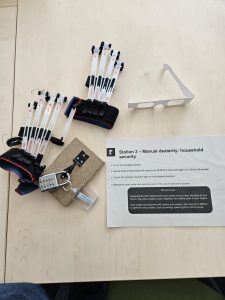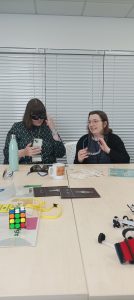April 22, 2024, by Laura Nicholson
Pop-Up Empathy Lab at the University of Nottingham: Understanding Accessibility
Today I share my reflections from attending a very thought-provoking empathy lab. The Digital and Technology Services at the University of Nottingham provides a pop-up empathy lab with simulator kits to offer staff and students the opportunity to gain insight into the potential experiences resulting from certain disabilities.

Image 1 – For one activity, restrictive gloves were provided to provide insight into the difficulties of completing manual dexterity tasks.
In total, there were seven learning stations, each of which provided a different insight. The types of activities included,
- Restrictive gloves to replicate some mobility impairments (see Image 1).
- Colour blindness simulators.
- Dyslexia simulators.
- Various visual glasses to replicate different conditions affecting vision, such as tunnel vision and cataracts.
Before I share my reflections, I just want to say that I cannot recommend this experience enough, and if anyone does get the chance to go along to an empathy lab, then it really is a very valuable learning experience.
Station 1: Dyslexia Simulator
Again, this experience was really impactful. The thing I noted the most was the time it took to complete everything. I always advise people to avoid using time-dependent content where possible, but it wasn’t until I was completing this online task using the simulator that I really understood the frustrations that must exist when trying to complete activities with a deadline. Throw-away comments like ‘This is a quick and easy task’ are not helpful or applicable to all, as there is no guaranteed universal experience; in fact, it’s quite the opposite. So, one key takeaway I took away from this session was just why it is so important to give people time.
Station 2: What can we do to support others?
This card matching activity really got me thinking about how the smallest of changes or acknowledgements could make a big difference to people. It wasn’t just about physical difficulties; it got you thinking about how just providing something like a meeting agenda can help reduce anxiety, maintain focus for those who can get easily overwhelmed, and give people a chance to prepare, increasing the likelihood of hearing more viewpoints on a topic.
Station 3: Simulator Glasses

Image 2: Members of the Learning Technology team use the simulator glasses while trying to complete an activity on their phone.
We used simulator glasses to help us understand what it can be like to perform an everyday task like finding a bus schedule (see Image 2). The glasses demonstrated what it would be like for someone doing this with cataracts, and it was not easy. Immediately, I was struck by how much I was relying on my knowledge of touch typing, as I couldn’t clearly see the keys on my keyboard. Long-distance views were just as difficult; even trying to make out people’s faces became a challenge.
Station 4: Colour blindness
Navigating the London underground can be trying at times, but I had never considered just how helpful it was to be able to distinguish between the different colours. We used a chromatic vision simulator to view the underground map and challenged ourselves to plan a suitable route. It was difficult. We also looked at graphs that had been designed using just colour as the main distinguisher, and although I advise using patterns, textures, and labels when creating graphs, I now have first-hand experience as to why this is so important.
Next steps
It is said that learning is most effective when it invokes emotion, as that helps you remember that moment again at some point in the future. That was definitely the case here; knowing about accessibility and the steps to take to support others is so very important, and the NAPS are a good place to start learning more. However, actually feeling what it is like has taken my understanding to a whole new level, so definitely give it a go.
The UoN pop-up empathy lab travels across different campuses throughout the year. If you’re interested in booking it, please contact Amy Hoddinott or Nichole Browne for more details. For all our non-UoN readers, I had a look around to see what empathy labs were available to attend around the UK, but sadly, it seems there are very few of these experiences available outside of specific organisations. As more people experience the advantages of these labs, hopefully word will spread, leading to their increased availability across a broader audience.
Useful links
Nottingham accessible practices (NAPS)
Visit the Nottingham accessible practices sharepoint. (Right-click this link and select ‘Open Link’).
The practices cover digital accessibility in teaching, learning, research and digital content.
Online colour-blind accessibility simulator you can try yourself
An extension for a colour blindness simulator that you can use to test your website’s accessibility.
No comments yet, fill out a comment to be the first

Leave a Reply